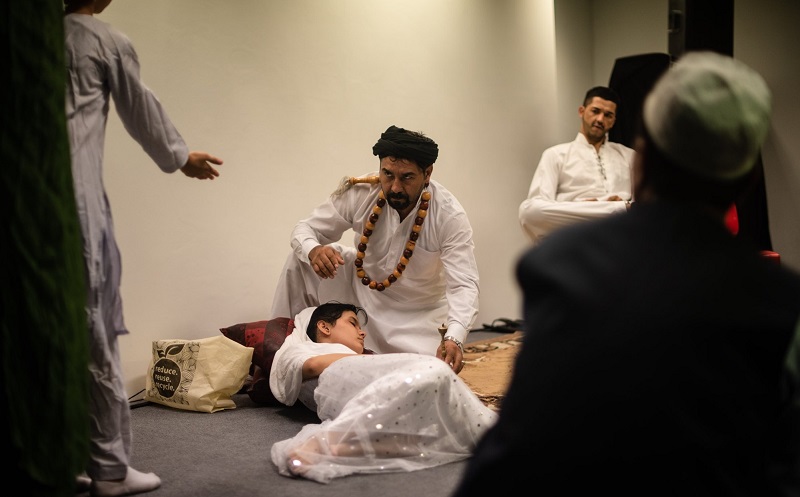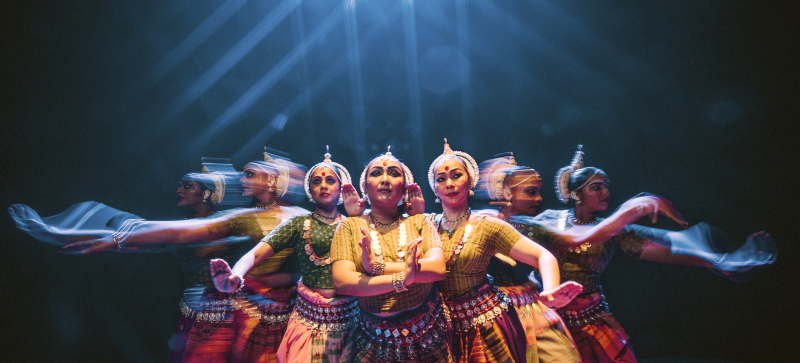
And Then Came Spring by Parastoo Theatre (Photo: Parastoo Theatre)
On the morning of March 16, Saleh Sepas, founder and director of Afghan refugee community theatre group Parastoo, and his actors were preparing to rehearse for their new show, And Then Came Spring, when they heard the bad news. It was not their usual practice time but they were expecting a media visit and interview later. However, news of a scheduled press conference came in before 11am with rumours of an imminent nationwide lockdown due to the Covid-19 outbreak. By evening, the show was cancelled.
“This would have been the biggest project produced by us,” says producer Amin Kamrani. “We had even sold out one of the shows.”
For now, the cast and crew are more worried about their welfare during the crisis. “It’s a hard situation for refugees in Malaysia as many have lost their jobs due to the closure of businesses. A lot of sacrifices were made for this project. None of us has been paid yet as we were waiting for ticket sales and sponsorships,” Amin explains.
screaming_in_silence_by_amin_kamrani.jpg

Suffice it to say, economies the world over are suffering from the effects of the Covid-19 pandemic and the closure of businesses by governments to stem the tide. Just last week, it was revealed that the famous Montreal-based circus giant, Cirque du Soleil, was looking at filing for bankruptcy as one of its debt-restructuring options, having temporarily laid off most of its performers and staff.
The arts and culture industry is particularly vulnerable at this time. As German Culture Minister Monika Grütters said when the country announced a sweeping aid package for its creative and cultural sector, it is an industry particularly characterised by a “high proportion of self-employed people who now have problems with their livelihoods”.
She went on to affirm the role of the arts: “The creative courage of creative people can help overcome the crisis … Artists are not only indispensable but also vital, especially now.”
In Malaysia, these words are but wishful thinking for its performing artists and theatre groups. But wistful and even desperate wishes must not be mistaken for whining and self-pity because the industry has been predominantly grassroots and privately supported all this while, although that reality has also stunted the growth potential of local arts.
Still, this period is testing the limits of our artists’ creative ability to sustain their livelihoods, that even their long-suffering, positive attitude may not tide them over.
Bearing the brunt in terms of scale is Malaysia’s foremost performing arts space, The Kuala Lumpur Performing Arts Centre (klpac), as well as the government-funded Istana Budaya. As at March 30, the closure had chalked up close to RM520,000 in losses for klpac, and counting.
klpacs_yesterday_once_more_show_1.jpg

However, its head of marketing and communications, Ang Yue May, has not been sitting on her hands since the Movement Control Order (MCO) took effect despite now also having to be a full-time teacher, homemaker and entertainer to her son while juggling work. Rather, she has been in constant communication with the National Department for Culture and Arts, supplying updated reports as requested.
“When your business is about being live, you cannot afford not to try your best to keep it going,” she says. From as early as February right up to the day the MCO was announced, the team was working to keep the shows, such as Yesterday Once More 3, going. “Director Ian (Chow) would come and tell me about his plans for 1m social distancing seating and trying to work with allowing only 250, then 50, people per show. Rehearsals were happening even the night before,” Ang says.
“I think it comes from Joe and Faridah’s philosophy,” she says of klpac co-founders and artistic directors, Joe Hasham and Datuk Faridah Merican. “They’ve weathered so much, from floods to sudden eviction notices, but each time they just picked themselves up and carried on. I think they passed that on to us. So, we will always work with whatever comes and within whatever constraints. Even now, we’re doing online script readings for casts, pre-production work still, so that we can get started as soon as possible. Otherwise, we have zero income.”
Sutra Foundation’s fundraiser performance, Triple Frontiers — an Odissi dance show focusing on three Indian female dance-makers, which was due to be staged from March 27 to 29 — is also a casualty. The two-hour production, along with its marketing and logistical planning, amounted to what felt like “thousands of hours of time and energy” spent on choreography, rehearsals, design, costumes, photography, graphics and sponsorship, according to artistic director Datuk Ramli Ibrahim.
“When we finally stage the show, we will have to do all of it all over again. Our first-time executive producer was particularly heartbroken as she was looking forward to seeing the fruits of our labour,” he says. “But we’re not the only one facing this calamitous pandemic; others are worse off.”
sutra_dancers_2019_photo_by_s_magendran_1.jpg

For ASK Dance Company, the postponement of their show, 3 Faces, is but the tip of the iceberg. The young professional dance company, one of the few full-time ones in Malaysia, funds itself largely through public classes and commercial performances. “The current situation is driving us to the point of madness, thinking how we can sustain our company,” says full-time member Kimberly Yap.
“We were just getting more regular students but that has been affected. Our outside jobs that help pay our overheads and production costs have also been cancelled. What we fear more is post-MCO. How will we recover from our losses? What about the well-being of us as dancers?”
Ang of klpac puts it realistically: “Post-MCO challenges are very real because the very nature of our business requires an audience, and as people are drained financially, it’ll take a long time to recover. It’s not just a matter of rescheduling. Postponement is a loss. If shows are pushed to next year and we stage only one show a year, this year is a loss. For us, venue rental picks up from mid to year-end, so if we reschedule — like we are still working on Singapore Dance Theatre’s Ballet Illuminations — it means other shows can’t take that slot.”
While she is cautiously optimistic about the possibility of government financial support, Ang says the least that can be offered are tax rebates and even the slashing of klpac’s electricity bill by 50%, which would halve their RM500,000-a-year burden.
Ramli says more candidly, “There was an ‘impak & implikasi’ questionnaire going around from a cultural agency. But that came and went rather mysteriously. I received it in the morning and the deadline was 3pm that same afternoon! So, as usual, it was a sad melepaskan batuk di tangga situation.”
Still, in each and all spoken to, there is a sense of buoyancy and hope for what is to come. Full-time musical theatre performer, dancer and singer Joshua Gui embodies the positivity that has permeated the realm of the arts at this time. While reading articles that were less than pleasant, particularly with misinformation and racism, he was inspired to create a parody video of himself singing Bonjour from Beauty and the Beast.
It went viral among Malaysians with many welcoming the entertaining message. Gui, who also runs his own entertainment company, is currently making ends meet with online private classes. “I’m thankful for that, especially since my projects are all postponed to the following year. For many of my peers, cash flow has come to a complete standstill. Our means of income is completely up in the air.”
There is also a sense of being deprived of doing what they love the most. Parastoo’s Amin says the group’s actors cannot wait to put on the show, having worked so hard on it. “The word ‘spring’ in the title of our show means hope. The world has been shaken but, if I can compare it to the World Wars in the previous century, art played a big role in narrating and leading the later generations. As the famous Persian adage says, ‘This, too, shall pass.’”
This article first appeared on April 6, 2020 in The Edge Malaysia.
__
On April 8, the Cultural Economy Development Agency (Cendana) — a governmental initiative set up to promote and develop the country’s cultural economy — outlined a recovery package to benefit artists and cultural workers in the performing arts, visual art and independent music sectors. Malaysian artists, collectives and art organisations will be able to apply for its Create Now Funding Programme, which provides grants of up to RM1,500 per individual artist or cultural worker and RM3,500 per collective or arts organisation. More details will be available on Cendana’s website on April 14.
Artists in the Klang Valley whose household income are of RM4,000 and below can also apply for food aid here.


